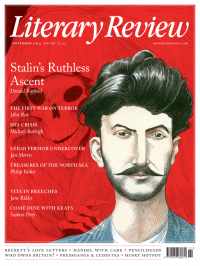Boyd Hilton
In Fear of the French
In These Times: Living in Britain through Napoleon’s Wars, 1793–1815
By Jenny Uglow
Faber & Faber 740pp £25
As the teacher of a university course on British history, I have read hundreds of essays on the question ‘How did the French Revolution and Napoleonic Wars impact on Britain?’ There is almost too much for students to write about. The collapse of the Foxite Whig party led to the long parliamentary dominance of Pittite and Portland Whigs. In many large towns there was an explosion of Jacobin-inspired radicalism, which was more than counterbalanced by waves of conservative loyalism. Society was increasingly militarised by the world’s first ‘total war’ and the very real threat of invasion. A counter-enlightenment took a grip of the Establishment, leading to the suppression of scientific and theological speculation in favour of an orthodoxy based on biblical authority and the notion of a providential natural order. Then there was the public silencing of women, whose imaginative sensibilities were perceived by patriarchs to be dangerous in times when nothing but sober rationality was called for. Meanwhile, a ‘second British empire’ was being established in India and along trade routes. Economic stimulus created financial instability, leading to the collapse of the currency and a burgeoning of public and private indebtedness. A series of subsistence crises was met by the spread of public welfare over much of southern England. The state’s control over the lives of citizens tightened with Pitt’s introduction of income taxes and repressive legislation, the extension of policing powers in the capital and the stationing of soldiers around the country. Most spectacularly, there was a sudden escalation of sectarian animosities in Ireland, leading to the bloody ethnic strife of 1798. All these developments can be linked to the French Revolution and the wars that followed.
Yet, having recited these arguments, the more astute undergraduates will consider the counterfactual alternative. Although the Revolution and Napoleon were both unstoppable, world-shaping forces, Britain was not itself static, and much of what I have mentioned would have happened anyway, albeit perhaps less dramatically. In particular, the rapid population growth

Sign Up to our newsletter
Receive free articles, highlights from the archive, news, details of prizes, and much more.@Lit_Review
Follow Literary Review on Twitter
Twitter Feed
It wasn’t until 1825 that Pepys’s diary became available for the first time. How it was eventually decrypted and published is a story of subterfuge and duplicity.
Kate Loveman tells the tale.
Kate Loveman - Publishing Pepys
Kate Loveman: Publishing Pepys
literaryreview.co.uk
Arthur Christopher Benson was a pillar of the Edwardian establishment. He was supremely well connected. As his newly published diaries reveal, he was also riotously indiscreet.
Piers Brendon compares Benson’s journals to others from the 20th century.
Piers Brendon - Land of Dopes & Tories
Piers Brendon: Land of Dopes & Tories - The Benson Diaries: Selections from the Diary of Arthur Christopher Benson by Eamon Duffy & Ronald Hyam (edd)
literaryreview.co.uk
Of the siblings Gwen and Augustus John, it is Augustus who has commanded most attention from collectors and connoisseurs.
Was he really the finer artist, asks Tanya Harrod, or is it time Gwen emerged from her brother’s shadow?
Tanya Harrod - Cut from the Same Canvas
Tanya Harrod: Cut from the Same Canvas - Artists, Siblings, Visionaries: The Lives and Loves of Gwen and Augustus John by Judith Mackrell
literaryreview.co.uk